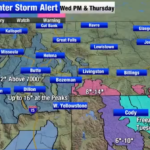About a year into the process of redetermining Medicaid eligibility after the COVID-19 public health emergency, more than 20 million people have been removed from the joint federal-state program for low-income families.
Numerous stories paint a picture of how the unwinding process has disrupted lives, with Native Americans facing particular challenges in maintaining coverage and reenrolling in Medicaid or finding alternate insurance options.
Kristin Melli, a pediatric nurse practitioner in Kalispell who serves tribal members on the Fort Peck Reservation through telehealth, expressed frustration with the redetermination process, citing cases where eligible individuals were mistakenly disenrolled, leading to a strain on healthcare resources and limited access to care in Native communities.
One alarming incident involved a teenager who lost coverage while seeking essential medical treatment, underscoring the detrimental impact of the unwinding process on individuals’ health and well-being.
State Senator Pat Flowers revealed that 13,000 tribal members in Montana had been disenrolled, highlighting the disproportionate impact on Indigenous populations, despite higher Medicaid enrollment rates among Native Americans compared to white counterparts.
Tribal leaders reported numerous challenges in the redetermination process, including lack of timely information for members, difficulties in reenrollment, and inadequate communication from states, exacerbating concerns about access to healthcare in Native communities.
Experts warned that vulnerable populations, including rural Indigenous communities, could face greater obstacles in renewing health coverage, with data limitations hindering a comprehensive assessment of the impact on disenrolled individuals.
KFF Health News is dedicated to producing in-depth journalism on health issues, operating as part of KFF, an independent source of health policy research, polling, and journalism.
More local news from KPAX





